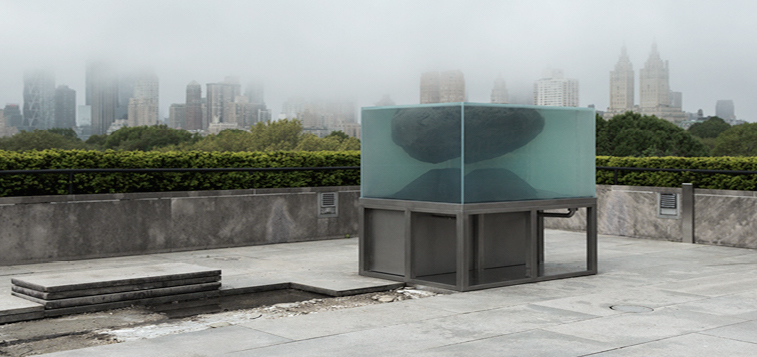Pierre Huyghe’s new work at the Met resembles both a natural history museum display and a land art installation. The French conceptual artist displaced some of the rooftop terrace’s paving stones, creating shallow holes filled with water that flows from an aquarium with glass walls that turn completely opaque at regular intervals. “Huyghe explained in a press statement that the tank’s visibility and invisibility is based on the beat of a human pulse,” writes David Ebony. “It adds a stunning and mesmerizing touch of theatricality that helps center the multifaceted installation.”
- All but one of the graduating MFA students from USC’s Roski School of Art and Design boycotted last week’s graduation ceremony—a protest in solidarity with the #USC7, the first-year students who dropped out of the program due to a withdrawal of funds and curricular changes.
- Walid Raad has been denied entry to the United Arab Emirates due to “security reasons.” He’s the third member of the Gulf Labor Coalition, which highlights labor conditions for workers building cultural institutions in Abu Dhabi, to be denied entry in recent weeks. “I remain (perhaps naively?) hopeful that these recent bans were all a ‘clerical error,’ an administrative ‘bump in the road,’ ” Raad stated. “I’d like to think that the UAE will be a welcoming place not only for its unabashed supporters but also for its peaceful and constructive critics.”
- After two decades as head of Creative Time, Anne Pasternak is leaving to become the first woman director of a major New York encyclopedic museum. On Sept. 1, she will begin as director of the Brooklyn Museum. “I think this is going to be a fabulous partnership,” said Elizabeth A. Sackler, chairwoman of the Brooklyn Museum’s board of trustees. “She is ready to lead an institution.”
- In order to meet its urbanization goals, China is systematically clearing land and building “generic” and “disposable” cities. “Houses that can last a century are not nearly as profitable as ones that can be demolished, rebuilt and sold three times over.” Wade Shepard shares an excerpt of his latest book, Ghost Cities of China.
- Two days before the the Havana Biennial opened, Cuban artist Tania Bruguera staged a performance in reaction to the “atrocious form of capitalism” that has been arising in her country: a 100-hour reading of Hannah Arendt’s The Origins of Totalitarianism. Bruguera is calling the project the Hannah Arendt International Institute of Artivism.
- Venetian officials have shut down down a mosque, part of an artwork by artist Christoph Büchel for the biennial’s Icelandic Pavilion. The decision follows “an evaluation by a committee tasked with maintaining order and public safety.” Despite the closing of the mosque, Icelandic authorities believe the project to have been a great success. “Wherever you look people have an opinion about it and thus inherently become participants in the work’s success.”
Follow Art News From Elsewhere on the Walker Art Center homepage or via @walkermag, the Walker’s editorial-focused Twitter feed.




